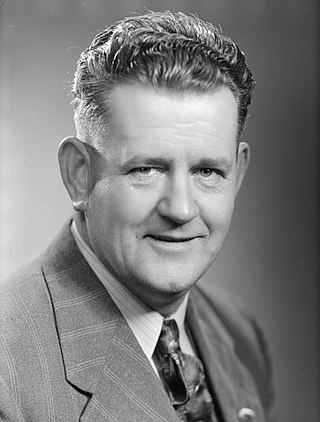
The 1949 New Zealand general election was a nationwide vote to determine the shape of the New Zealand Parliament's 29th term. It saw the governing Labour Party defeated by the opposition National Party. This marked the end of the 14-year First Labour government and the beginning of the First National government.
The Onehunga by-election of 1980 was a by-election for the Onehunga electorate during the 39th New Zealand Parliament. It was prompted by the death of Frank Rogers, a Labour Party MP. It was held on 7 June 1980 and was won by Fred Gerbic, also of the Labour Party.
Arch Hill was one of 80 electorates in New Zealand between 1946 and 1954. Located in central Auckland, the electorate was considered a safe seat for the Labour Party in its eight years of existence.

Tāpihana Paraire "Dobbie" Paikea, also known as Dobson, was a New Zealand politician and Rātana morehu who won the Northern Maori electorate for Labour in 1943. He was a Māori of Te Roroa, Te Parawhau and Ngāti Whātua descent. He was elected following the death of his father Paraire Karaka Paikea who had been the MP, and he held the parliamentary seat until his own death in 1963.

Maungakiekie is a New Zealand parliamentary electorate, returning one Member of Parliament to the New Zealand House of Representatives. The current MP for Maungakiekie is Greg Fleming of the National Party. The electorate's name comes from Maungakiekie / One Tree Hill, a large and symbolically important hill at the western end of the seat.

Auckland Central is a New Zealand electoral division returning one member to the New Zealand House of Representatives. The electorate is currently represented by Chlöe Swarbrick, a member of the Green Party; she has represented the seat since 2020.

Frederick Hackett was a New Zealand politician of the Labour Party. He was a minister in both the First and Second Labour Governments of New Zealand and later the deputy leader of the opposition.

New Lynn is a New Zealand parliamentary electorate, returning one member to the New Zealand House of Representatives. Deborah Russell of the Labour Party represented the electorate from the 2017 general election before being defeated by National's Paulo Garcia in the 2023 election.

Norman Vazey Douglas was a New Zealand trade unionist and left-wing politician. He joined the New Zealand Labour Party in 1932, but when John A. Lee was expelled from the party in 1940, Douglas followed to join the new Democratic Labour Party. He rejoined the Labour Party in 1952 and represented the Auckland Central electorate in Parliament from 1960 until his retirement in 1975, serving time on the Opposition front bench.
Edward Emanuel Isbey was a New Zealand politician of the Labour Party.

Botany is a New Zealand parliamentary electorate, returning one Member of Parliament to the New Zealand House of Representatives. It was contested for the first time at the 2008 general election, and won by Pansy Wong for the National Party. Following Wong's resignation in late 2010, a by-election returned Jami-Lee Ross, who was confirmed by the voters in the 2011 general election. Ross left the National Party in October 2018 and became an independent. Ross did not contest the seat at the 2020 general election, and was succeeded by the new National candidate, Christopher Luxon, who became the party's leader in November 2021 and has served as prime minister since November 2023.

Ritchie Macdonald was a New Zealand politician of the Labour Party.
The former New Zealand parliamentary electorate on the western inner city of Auckland, was known as City of Auckland West from 1861 to 1890, and then Auckland West from 1905 to 1946.
Ponsonby was a parliamentary electorate in Auckland, New Zealand, from 1887 to 1890 and from 1946 to 1963. The Ponsonby electorate was represented by two Members of Parliament.

The Mangere by-election of 1977 was a by-election for the electorate of Mangere on 26 March 1977 during the 38th New Zealand Parliament. The by-election resulted from the resignation of the previous member Colin Moyle after accusations against him in parliament, and he was replaced by David Lange, also of the Labour Party. Apart from Lange, there were seven other candidates in the by-election.

The Northern Maori by-election of 1963 was a by-election for the electorate of Northern Maori on 16 March 1963 during the 33rd New Zealand Parliament. The by-election resulted from the death of the previous member Tapihana Paikea on 7 January 1963. It was held the same day as the Otahuhu by-election.

Jennifer Teresia Salesa is a New Zealand politician and member of the Labour Party who has served as a Member of Parliament since 2014. She was first elected as MP for Manukau East, and after its abolition in 2020 won the replacement electorate of Panmure-Ōtāhuhu. She served as a Cabinet Minister in the Sixth Labour Government as Minister for Building and Construction, Minister of Customs and Minister for Ethnic Communities from 2017 until 6 November 2020.
The Otahuhu by-election 1963 was a by-election held in the Otahuhu electorate in Auckland during the term of the 33rd New Zealand Parliament, on 16 March 1963.

The Onehunga by-election 1953 was a by-election held in the Onehunga electorate in Auckland during the term of the 30th New Zealand Parliament, on 19 December 1953. The by-election was won by Hugh Watt of the Labour Party.

The 1945 Hamilton by-election was a by-election held during the 27th New Zealand Parliament in the Waikato electorate of Hamilton. The by-election occurred following the death of MP Frank Findlay and was won by Hilda Ross, both of the National Party.















